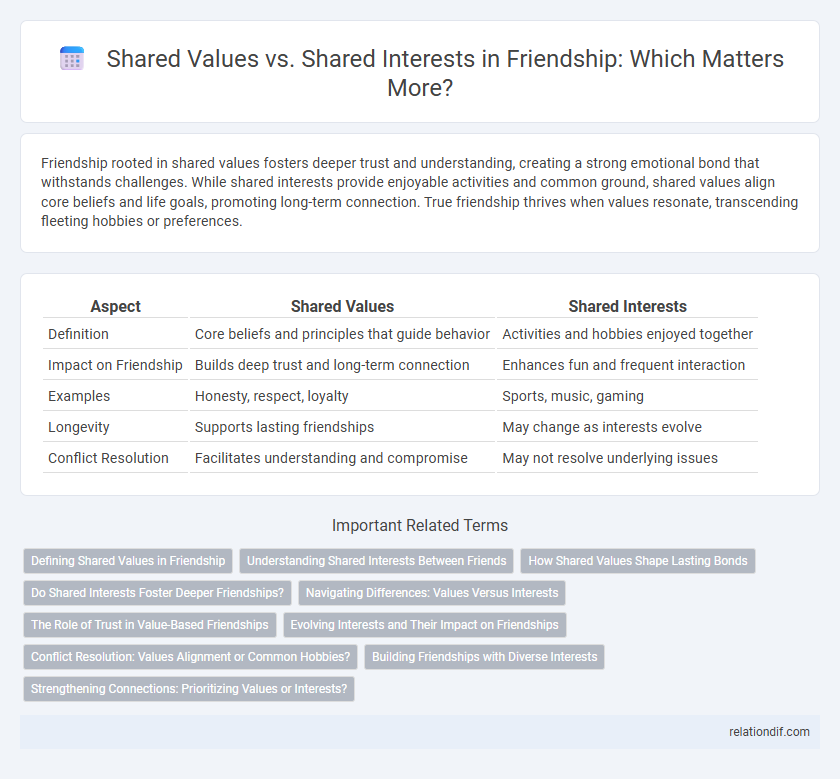Friendship rooted in shared values fosters deeper trust and understanding, creating a strong emotional bond that withstands challenges. While shared interests provide enjoyable activities and common ground, shared values align core beliefs and life goals, promoting long-term connection. True friendship thrives when values resonate, transcending fleeting hobbies or preferences.
Table of Comparison
| Aspect | Shared Values | Shared Interests |
|---|---|---|
| Definition | Core beliefs and principles that guide behavior | Activities and hobbies enjoyed together |
| Impact on Friendship | Builds deep trust and long-term connection | Enhances fun and frequent interaction |
| Examples | Honesty, respect, loyalty | Sports, music, gaming |
| Longevity | Supports lasting friendships | May change as interests evolve |
| Conflict Resolution | Facilitates understanding and compromise | May not resolve underlying issues |
Defining Shared Values in Friendship
Defining shared values in friendship centers on mutual beliefs and principles like trust, honesty, and respect that create a strong foundation for lasting connections. Unlike shared interests, which are often activity-based and change over time, shared values provide deeper emotional alignment and guide behavior during conflicts or life challenges. Friendships grounded in shared values tend to demonstrate greater resilience and deeper emotional intimacy, fostering long-term loyalty and understanding.
Understanding Shared Interests Between Friends
Understanding shared interests between friends reveals common activities or hobbies that create a foundation for bonding and enjoyment. While shared values guide long-term compatibility and trust, shared interests foster frequent engagement and memorable experiences. Recognizing both dimensions strengthens friendships by balancing meaningful connection with dynamic interaction.
How Shared Values Shape Lasting Bonds
Shared values create a foundation of trust, respect, and mutual understanding essential for enduring friendships. Unlike shared interests, which may change with time, shared values provide stability and align behavior, fostering deeper emotional connections. Friends bonded by common principles navigate conflicts more effectively and support each other's growth authentically.
Do Shared Interests Foster Deeper Friendships?
Shared interests create initial bonds by providing common activities and conversation topics, but shared values foster deeper, enduring friendships rooted in trust and mutual understanding. Research shows that friendships built on aligned core beliefs, such as honesty and empathy, exhibit greater resilience and emotional intimacy. Prioritizing shared values over fleeting interests leads to more meaningful and lasting social connections.
Navigating Differences: Values Versus Interests
Navigating differences in friendship requires understanding that shared values create a stronger foundation than shared interests, as values shape long-term beliefs and behaviors while interests often change over time. Friends with aligned values are more likely to support each other's life choices and resolve conflicts effectively, fostering deeper trust and loyalty. Emphasizing common principles such as honesty, respect, and empathy helps maintain connection despite diverging hobbies or activities.
The Role of Trust in Value-Based Friendships
Trust forms the foundation of value-based friendships, as shared values create deep alignment in beliefs and principles, fostering reliability and emotional safety. Unlike shared interests that may fluctuate, trust rooted in common values promotes long-term commitment and mutual understanding. This trust enables friends to navigate conflicts effectively, strengthening their bond beyond superficial activities.
Evolving Interests and Their Impact on Friendships
Evolving interests often challenge the foundation of friendships built solely on shared activities, as divergent pursuits can create distance over time. Shared values provide a deeper, more resilient connection by fostering mutual understanding and respect despite changing hobbies or lifestyles. Maintaining friendships requires adapting to these shifts and prioritizing core values that sustain emotional bonds beyond temporary interests.
Conflict Resolution: Values Alignment or Common Hobbies?
Conflict resolution in friendship often hinges on shared values rather than common hobbies, as values provide a stable foundation for understanding and compromise during disagreements. While common interests can facilitate bonding, aligning core beliefs fosters deeper empathy and long-term harmony. Prioritizing values alignment promotes trust and effective communication, essential for resolving conflicts constructively.
Building Friendships with Diverse Interests
Building friendships with diverse interests strengthens social bonds by encouraging open-mindedness and mutual respect, transcending mere shared values. Engaging in activities that differ from personal preferences fosters empathy and broadens perspectives, creating a richer and more dynamic connection. This approach enhances communication skills and nurtures deeper understanding, laying a foundation for lasting and meaningful friendships.
Strengthening Connections: Prioritizing Values or Interests?
Strengthening connections in friendship relies more on shared values than shared interests, as values shape core beliefs and long-term compatibility. While common interests provide enjoyable experiences and initial bonding, alignment in values ensures deeper trust and mutual understanding. Prioritizing values fosters resilience in relationships, enabling friends to support each other through challenges and growth.
shared values vs shared interests Infographic

 relationdif.com
relationdif.com